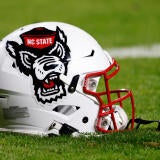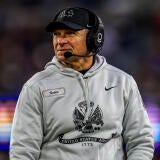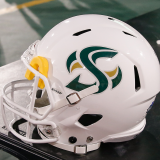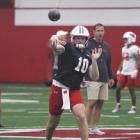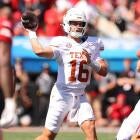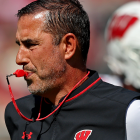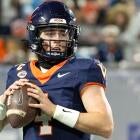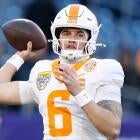Tyler Van Dyke's last chance at career redemption means turning Wisconsin's Air Raid dreams into reality
Once on the cusp of becoming a superstar, Van Dyke hopes to reinvigorate a derailed career with the Badgers

INDIANAPOLIS — Tyler Van Dyke has spent enough time with enough offensive coordinators to know he has to be nimble.
Three different offensive coordinators -- and three coaches -- in three years can make even the best quarterback question what's up and down and which receiver is open. For Van Dyke, an explosive first season at Miami set high expectations, but a coaching change followed, and with it came struggles and frustration compounded by injuries. Sudden shifts in philosophy and terminology provided harsh and unforgiving learning curves. And as injuries nagged, progression quickly transformed into regression in his final two seasons with the Hurricanes.
The 6-foot-4 Van Dyke seemed poised to return to elite status early last season before he bottomed out in the second half of the season. He led the ACC in quarterback rating and completion percentage midway through 2023 but regressed quickly, throwing 11 picks in a five-game stretch. He lost his job to freshman Emory Williams ahead of the Florida State game but was forced back into action when Williams broke his left arm in that same game.
Meanwhile, Van Dyke was battling a rare leg injury, a lesion causing skin to separate from the muscle and fat below his right knee. The hobbled quarterback finished the year completing 65.8% of his throws for 2,703 yards with 19 touchdowns and 12 interceptions, but the regression in the second half of the season overshadowed the hot start. He threw only three touchdowns against six interceptions in his final five appearances.
"That's what I love most about him: The ability to see him at a high-high at Miami, then in a low-low, his ability to continue to battle back and grow from all those experiences," said Wisconsin coach Luke Fickell.
For all the complications, Van Dyke found solace in the transfer portal and the simplifications of a new life with the Badgers. Yes, the decision to leave Miami provided more obstacles with yet another new coach and coordinator for him to adjust to (four in four years), but instead of throwing more problems in his path, Fickell asked the redshirt senior in January to focus on himself.
"We need to make sure you get back into the mode of being a leader, getting in the mode of understanding what quarterbacks can do for the people that are around them," Fickell said.
The Badgers coach realized Van Dyke lost his identity in a sea of changes at Miami. The last thing he needed was a full plate of new information and challenges before facing a quarterback competition with an incumbent (three-game starter Braedyn Locke) in Madison.
"When you become a little bit too much of a quarterback, I think sometimes things go another direction," Fickell said at Big Ten Media Days. "And so my mind of things is, we need to make sure you get back into the mode of being a leader, getting in the mode of understanding what quarterbacks can do for the people that are around them. That has something to do with how you train, and your ability to move around and run."
How a quarterback runs? Van Dyke has never been much of a blazer on the field, but being nimble in the pocket is paramount. More time to throw -- and create on busted plays -- is a requirement in the modern age of the sport. It's also a prerequisite in offensive coordinator Phil Longo's system. Nearly every quarterback to graduate through his high-flying passing system -- including record-breaking North Carolina star Sam Howell, who totaled for 1,009 yards rushing in three seasons -- has been asked to run.
That wasn't the case during Van Dyke's last season at Miami. Heck, he's never been a super productive scrambler, even during his freshman season in 2021 when he seemed poised to dominate the national conversation for three more years after jumping on the scene with 2,931 yards and 25 touchdown passes.
"His first year, starting at Miami, he ran pretty well and he looked different," Fickell said. "I thought his last two years he looked, you know, more like just a quarterback and a little bit bigger and heavier."
Van Dyke shed 10 pounds in the offseason at Wisconsin and "runs completely different than he did even six months ago," Fickell said. Though Wisconsin doesn't list weights on its roster, the quarterback was tabbed as a 240-pounder at Miami and enters preseason camp as the favorite to be the Badgers' starting quarterback. Coaches stress they are not simply "handing the keys" to him as they did a year ago with SMU transfer Tanner Mordecai, who never quite met expectations in his lone year in the Big Ten. Injuries kept him on the sideline for three games, forcing Locke to start -- and succeed -- with five touchdown passes against zero interceptions in three starts, including a game-winning pass in his first appearance against Illinois.
"Tyler has a huge arm. Tyler can probably fit some things in, triggering a little bit later than maybe Braedyn can," Longo said. "Braedyn can make all the throws; Tyler can probably be a little late on something and fit it in a window because of the arm talent he has. And that challenges Braedyn."
It seems so clear that Wisconsin has fallen in love with Van Dyke's redemption tour, and yet coaches are wary of handing the Miamii transfer the offense. Competition certainly helps players grow. Wisconsin is also dealing with the aftermath of a disappointing year with Mordecai, who battled injuries and recorded the worst numbers of his career in a new offense. Mordecai was a superstar at SMU, where he was an all-AAC player and broke an FBS record with nine touchdown passes in a single game.
Like Van Dyke, Mordecai's best season was the byproduct of playing in an offense led by play-caller Rhett Lashlee. Longo also watched Van Dyke up close during his time coaching in the ACC and quickly targeted the quarterback in the offseason when he jumped into the portal.
For Fickell, the practice of adding transfer quarterbacks will end soon.
"Nobody wants to be in the mode of bringing in quarterbacks, one-year guys, every year," Fickell said. "That's an incredible emphasis for us. That's not the route that we want to go to continue to build."
And build, Fickell must. Wisconsin has established an entire identity on smash-mouth football. Its two Heisman winners (Alan Ameche and Ron Dayne) were studs in the backfield, and the latter set the FBS record for career rushing yards until he was eclipsed by Donnel Pumphrey from San Diego State. The Badgers routinely churn out NFL-caliber running backs and offensive linemen.
Conversely, Wisconsin's first year under Fickell with Longo's offense can be best described as an unending case of the hiccups. Transitioning from decades of ground-and-pound offenses to an Air Raid system was destined to take more time than planned, even with the best of intentions. The Badgers' offense hovered in the middle of the Big Ten and so did the record, a 7-6 season with a loss in the ReliaQuest Bowl.
"Philosophically, it is an Air Raid-based offense, but we want to run to open grass and take advantage of the numbers in the run game the same way we do in the pass game," Longo said.
Will Pauling had big numbers, nearly doubling the production of the Badgers' second-leading receiver with 74 catches for 837 yards and six touchdowns. That stat line shed light on a symptom of an underlying issue: Wisconsin didn't have enough breakout receivers.
"Yes, we have all those catches but it became probably too predictable, they became too short," Fickell said. "And everybody's converging on one guy."
A few new receivers and a new quarterback hope to change the trajectory. Last week, as myriad quarterbacks represented Big Ten programs at the conference's annual media days, Wisconsin opted to not bring its own, a year after featuring Mordecai on the big stage well before he took his first snap as a Badger.
For now, everyone else is tasked with talking about Van Dyke until he proves himself, one way or the other.
"He's a little quieter, but still a great leader, team player, he's not gonna give you any kind of flak, he's not gonna give you any kind of stereotypical quarterback prima donna," left tackle Jack Nelson said. "He's not anything like that. He comes to work. He leads by example. And he's most definitely a team player."





